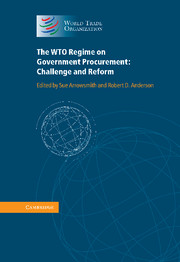Book contents
- Frontmatter
- Contents
- List of contributors
- Foreword by Pascal Lamy
- Perspective of the Chairman of the WTO Committee on Government Procurement, Nicholas Niggli (Switzerland)
- Preface
- Disclaimer
- PART I The WTO regime on government procurement
- PART II Expanding the scope of the Agreement on Government Procurement: accession and coverage
- PART III Revision of the procedural rules and other transparency provisions of the Agreement on Government Procurement
- PART IV Developing countries in the WTO procurement regime
- 11 Special and differential treatment and other special measures for developing countries under the Agreement on Government Procurement: the current text and new provisions
- 12 Building sustainable capacity in public procurement
- 13 Untying aid through the Agreement on Government Procurement: a means to encourage developing countries' accession to the Agreement and to improve aid effectiveness?
- PART V Economic and social development (horizontal policies) in government procurement
- PART VI Enforcement and remedies
- PART VII Multilateralism and regionalism
- PART VIII Challenges and new directions
- Index
11 - Special and differential treatment and other special measures for developing countries under the Agreement on Government Procurement: the current text and new provisions
from PART IV - Developing countries in the WTO procurement regime
Published online by Cambridge University Press: 07 September 2011
- Frontmatter
- Contents
- List of contributors
- Foreword by Pascal Lamy
- Perspective of the Chairman of the WTO Committee on Government Procurement, Nicholas Niggli (Switzerland)
- Preface
- Disclaimer
- PART I The WTO regime on government procurement
- PART II Expanding the scope of the Agreement on Government Procurement: accession and coverage
- PART III Revision of the procedural rules and other transparency provisions of the Agreement on Government Procurement
- PART IV Developing countries in the WTO procurement regime
- 11 Special and differential treatment and other special measures for developing countries under the Agreement on Government Procurement: the current text and new provisions
- 12 Building sustainable capacity in public procurement
- 13 Untying aid through the Agreement on Government Procurement: a means to encourage developing countries' accession to the Agreement and to improve aid effectiveness?
- PART V Economic and social development (horizontal policies) in government procurement
- PART VI Enforcement and remedies
- PART VII Multilateralism and regionalism
- PART VIII Challenges and new directions
- Index
Summary
Introduction
This chapter analyses the special and differential treatment (‘S&D’) provisions and other special measures for developing countries contained in the WTO Agreement on Government Procurement (GPA), with reference to both the existing and the revised GPA texts. As discussed in previous chapters of this volume, the GPA is currently being renegotiated, with the most significant achievement to date being the Parties' provisional agreement on a revised text. In the renegotiation of the text, the S&D provisions of the GPA have been extensively revised and the Parties to the Agreement have made it clear that they attach much importance to these provisions, in particular as a basis for facilitating accessions to the Agreement by new developing country Parties. Hence, an assessment of the new as compared to the existing S&D provisions is an important element of an overall examination of the revision of the GPA as a whole.
S&D provisions are, of course, a feature of virtually all WTO Agreements. In assessing the S&D provisions of the GPA, it is important to consider the general role of S&D in the WTO in addition to its specific relevance with respect to government procurement. The Agreement Establishing the World Trade Organization (also known as ‘the WTO Agreement’) in its preamble cites sustainable economic development as one of the objectives of the WTO. It also specifies that international trade should benefit the economic development of developing and least developed countries.
- Type
- Chapter
- Information
- The WTO Regime on Government ProcurementChallenge and Reform, pp. 339 - 376Publisher: Cambridge University PressPrint publication year: 2011
- 1
- Cited by

